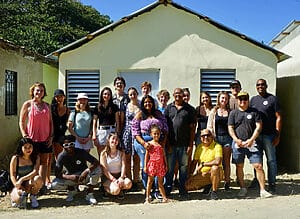We make them Disposable People
Since we started this year’s tour and the new class for our school of leadership started, we have been reading books alongside the students on our teams. One of these books was called Disposable People and while reading it I started to think about my role in supporting the process of disposing of people. We are all directly involved in this disposal, whether you believe it or not.
We have to recognize that money shouts where pleas for human rights go unheard
P.147 Disposable People: New Slavery In The Global EconomyKevin Bales
If we are going to effect any change in our world, we first need to be educated on what injustices are going on and where, and we need to make our money speak louder than words.
We are citizens of an ever shrinking globe, and we need to become aware of that. I want to recognize that the problems in countries like Thailand, Brazil, China, Mexico, Haiti etc. are our problems. They are my problems. We, in the Western world, are causing or supporting the ongoing exploitation of people around our world. People, real people. We are the richest people in the world. Our consumerism supports every industry that exploits people. Whether it is the shoes we wear or the cars we are driving or the houses we live in, it is fairly safe to say that someone was exploited somewhere along the lines of production. Whether it is the steel in our houses or cars, or the rubber used to make our shoes, or the cotton used to make our shirts, almost nothing is exempt. We must make our money speak louder than our words!
Media mixed with many voices lobbying huge corporations to act instead of turning a blind eye could have major influence. Making your voice heard in Governmental circles could, by extension, make those corporations listen. Ignoring the exploitation of human beings to maintain a huge bottom line is one of the greatest sins of our corporate history, and we have been a part of it. We have demanded lower prices which in turn has “forced” companies to lower production costs. And where do they get this cheaper production? From cheaper labor, by moving factories to countries where they can find people who will do anything for a dollar a day. People who live in situations so desperate that it becomes easy to exploit them, stateless and faceless people who are ignored or unknown by their governments, the UN, and us. And there are so many people who are desperate that if this one doesn’t work out you can just go out on the street and pick up three more to replace her. Let’s demand something new. Let’s demand to know where our money is going. Ask people “do you know where that dollar just went?” Ask Steel workers in Hamilton, Boutique owners in Toronto, corporate associates in Vancouver, Oil rig workers in Alberta. Canadians wouldn’t buy what they buy in the quantities they buy if they knew the cost to other individuals.
“The people back home wouldn’t buy a ring if they knew it cost someone else their hand” Maddy Bowen in Blood Diamond.
We need faces not statistics (see One: A Face Behind the Numbers) and we need to see these faces first-hand. We need Canadians, ordinary Canadians like me and you, to travel to these places to see with their own eyes the things that plague the people of developing countries. We need education on so many levels, not just the education for nations that can’t afford to put their children through school, but also for us. We need a life education: an education of experience.
What can we do? From home, we can try to get corporations to knee jerk react to a violation of human rights in a production supported or owned by them. Then Lobby our Governments to put in place and sustain effective policy makers and keepers. We can research and put a little work into finding out where the clothes you are about to buy come from. What hands touched this fabric? Were they free or slave hands? What you buy can define what you care about. From abroad? Just go! Mother Teresa used to say “just come!”. So go, see, and experience with your own eyes and life what is going on in these places. Meet and talk with the people, get to know a family and then come back home and try to live according to what you saw.
If we realized that the problems of our Global community are also our problems, things would inevitably change. This is my problem. If we truly understood that our consumption of goods really did place or keep people in slavery, would we consume the same products in the same way? In the same quantity? Would we be more inclined to do something about this Modern Slavery? We have the Fuel, we need a Fire.


